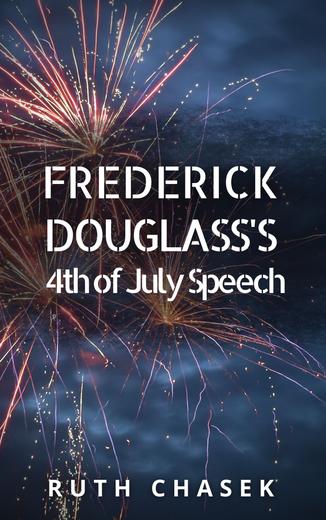
Age:
Middle School
Reading Level: 7.4
Preface
ⓒRuth Chasek 2022
“Keep pounding on the rock and listen for the thunder.”
Frederick Douglass, 1861
Keep "faith in the power of truth."
Frederick Douglass, 1893
“I have always been troubled by the thought of having no birthday.”
Frederick Douglass, 1893
Chapter 1: "What to a Slave Is the Fourth of July?"
Fireworks
At 34 years old, Frederick Douglass gave the most famous speech of his life on July 5, 1852.
The fourth of July is a national holiday in the United States celebrating freedom. It honors the date of the Declaration of Independence, which stated that the United States was free from England.
In his speech, Douglass tried to explain what the fourth of July meant to slaves. He gave the speech on the fifth of July in Rochester, New York, where he lived and worked at the time.
The speech was called, “What to a Slave Is the Fourth of July?”
Douglass started by explaining why the fourth of July was important. He said the United States was still a young country.
"This . . . is the 4th of July. It is the birthday of your National Independence, and of your political freedom. . . . the Republic of America is now 76 years old. . . . Seventy-six years, though a good old age for a man, is but a mere speck in the life of a nation.
"The simple story of it is that, 76 years ago, the people of this country were British subjects. . . . But, your fathers . . . [declared] the measures of government unjust, unreasonable, and oppressive . . . To say now that America was right, and England wrong, is [very] easy. Everybody can say it . . ."
- "What to a Slave Is the Fourth of July?", pp. 4-6
Chapter 2: Oppression and Justice
Flag
The 13 British colonies felt oppressed by England. They wanted justice. They wanted freedom. They started a fight for freedom called the American Revolution. The 13 colonies won the right to be a free and independent nation, which became the United States of America.
Who were these people who fought for freedom from England?
"They who did so were . . . agitators and rebels, dangerous men. [They sided] with the right, against the wrong, with the weak against the strong, and with the oppressed against the oppressor! . . .
"Oppression makes a wise man mad.
"Your fathers were wise men."
- "What to a Slave Is the Fourth of July?", p. 6
On July 4, 1776, the founding fathers wrote this in a paper called the Declaration of Independence:
"These united colonies are . . . free and Independent States . . . and that all political connection between them and the State of Great Britain is . . . dissolved."
- "What to a Slave Is the Fourth of July?", p. 8
Colonies